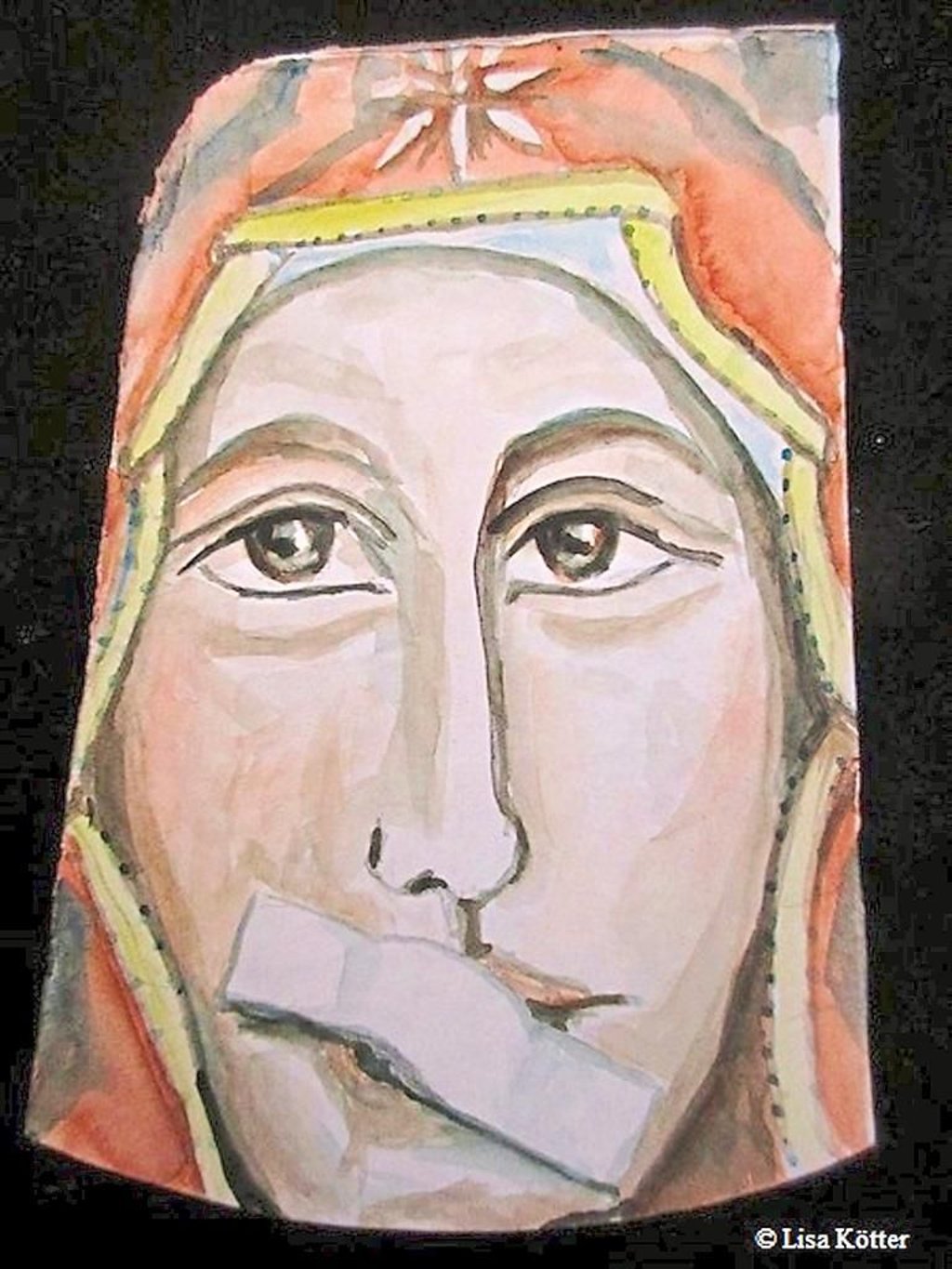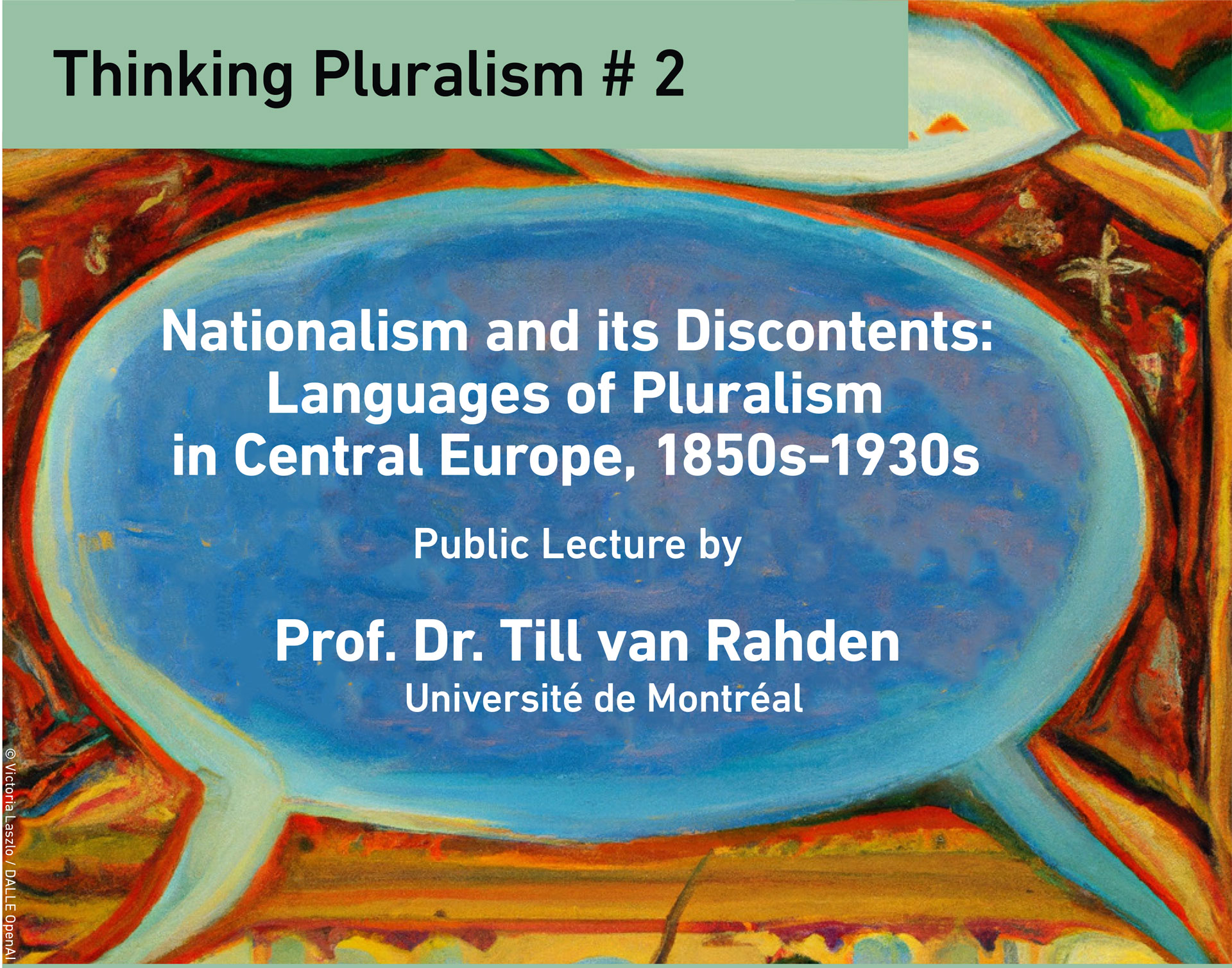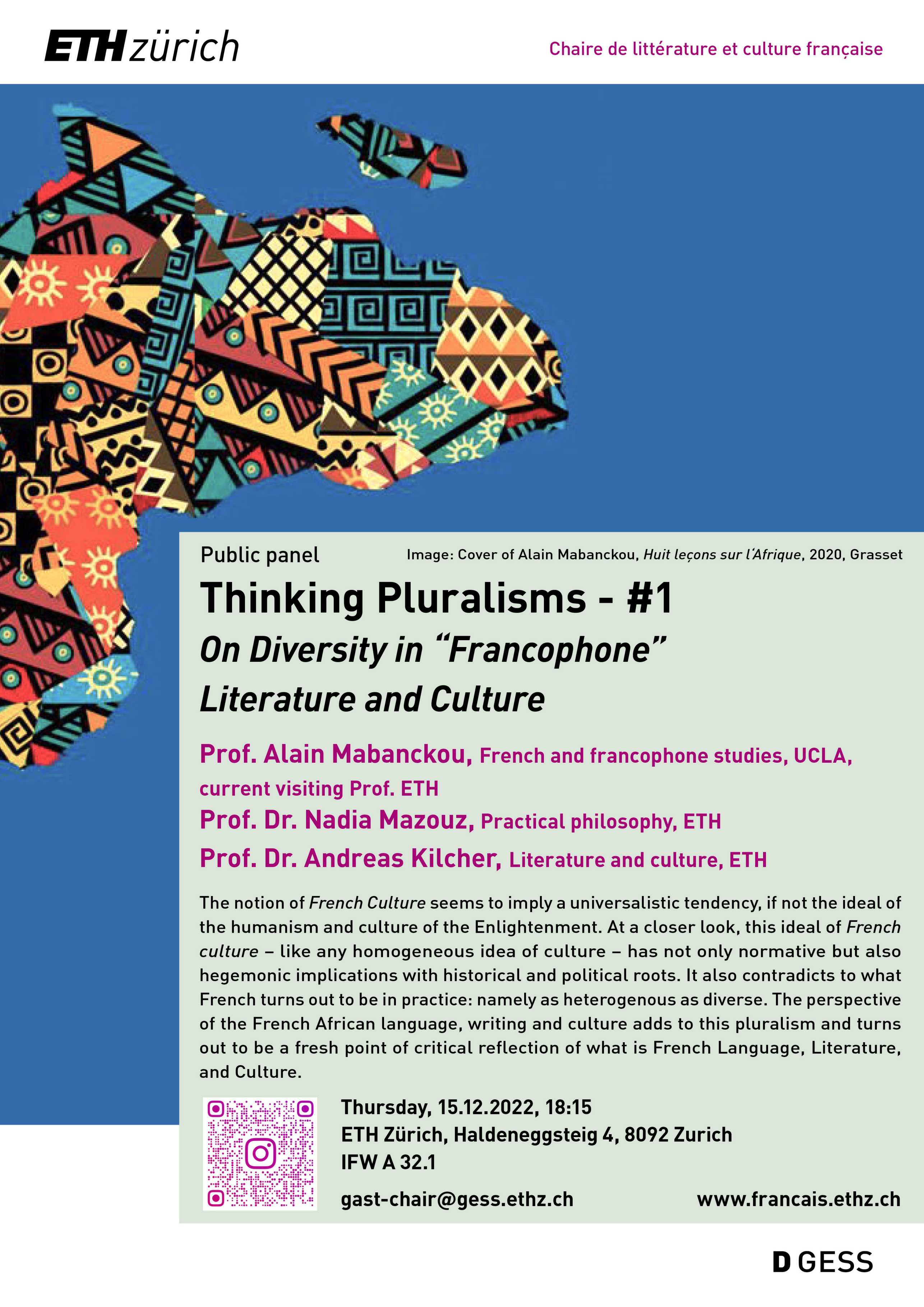Lecture Series: Thinking Pluralisms
Pluralism is a powerful and ambivalent concept. Pluralism of knowledge, culture, and values is declared a political aim necessary to address pressing contemporary societal challenges. At the same time, people use pluralism to defend forms of relativism that undermine a sense of and commitment to a just common world. ETH Knowledge Section convenes the Thinking Pluralisms lecture series to investigate the forms, histories, and significance of epistemic, cultural, and normative pluralisms today.
Thinking Pluralisms # 7
Decentralising Universalism
Decentralisation of Multiculturalism
A conversation between Louis-Philippe Dalembert, Nadia Mazouz, and Andreas Kilcher

Louis-Philippe Dalembert
Louis-Philippe Dalembert is a visiting professor of French literature and culture at ETH Zurich. He is known for his novels, short stories, poems and essays, which he has written in French and Haitian Creole. His works bear witness to his ability to cross cultural and linguistic boundaries. He was awarded the Chevalier de la Légion d'Honneur.
Nadia Mazouz
Nadia Mazouz is a physicist and philosopher. Her research focuses on fundamental issues in practical philosophy and applied moral issues. She is a professor of practical philosophy at ETH Zurich.
Andreas Kilcher
Andreas Kilcher is Professor of Literature and Cultural Studies at ETH Zurich. His research focuses on the history of Jewish literature and culture, literature and the history of knowledge, as well as Kabbalah and occultism. His most recent works are dedicated to Franz Kafka.
Language of the event: French with automatic translation into English.
Date and time: Tuesday, 29 October 2024, 18:15h
Location: ETH Zurich, Clausiusstrasse 59, RZ F 21
Everyone is welcome!
Emergent Pluralisms: Ethics in the Age of Generative AI
Prof. Dr. Louise Amoore
The questions that confront us are many: what are the challenges for data ethics in the age of ChatGPT and generative AI models? Do we need to rethink what we mean by “ethics” when algorithms are extracting, selecting and generating the features that matter? The rapid rise of generative AI has posed new challenges for what I have elsewhere called a “cloud ethics”. That is to say, one cannot stand outside of the world of generative AI to adjudicate its ethics because it is actively remaking that world. In one sense generative AI appears to embrace pluralism and the multiplicities of governing societies. The computational paradigm shift – from the use of broadly structured, domain specific, labelled data for specific tasks, to the training of a general model on large corpora of data – embraces the discovery of emergent properties from data distributions. In this talk I will suggest that generative AI is challenging the idea of ethics in ways that amplify the already existing difficulties and limitations of historical statistical and machine learning models. The question of ethics does not reside solely or primarily with the output that is generated by a model, but rather with generativity as such – with the world-making capacities of algorithms that incorporate and foreclose plurality and diversity.
Bio
Louise Amoore is Professor of Political Geography and Deputy Head of Department. Her research and teaching focuses on aspects of geopolitics, technology and security. She is particularly interested in how contemporary forms of data and algorithmic analysis are changing the pursuit of state security and the idea of society. Her most recent book, Cloud Ethics: Algorithms and the Attributes of Ourselves and Others, is published by Duke University Press in Spring 2020. Among her other published works on technology, biometrics, security, and society, her book, external page The Politics of Possibility: Risk and Security Beyond Probability (2013)examines the governance of low probability, high consequence events, and its far-reaching implications for society and democracy. Louise’s research has been funded by the Leverhulme Trust, ESRC, EPSRC, AHRC, and NWO. She is appointed to the UK independent body responsible for the ethics of biometric and data-driven technologies. Louise is co-editor of the Journal Progress in Human Geography.
Louise's previous projects include her RCUK Global Uncertainties leadership fellowship (2012-2015). Her project 'external page Securing Against Future Events' (SaFE): Preemption, Protocols and Publics' examines how inferred futures become the basis for new forms of security risk calculus.
She has also conducted ESRC projects on the techniques and technologies of biometric and data-driven borders: 'Contested Borders' (2007-2009), a project within the ESRC's non-governmental public action programme. The work has produced new insights into how contemporary security practices enter and reconfigure public space.
'external page Data Wars: New Spaces of Governing in the European War on Terror' (2008-12) was a three year ESRC bilateral project in collaboration with Marieke de Goede at the University of Amsterdam. Researchers at Durham and Amsterdam investigated how data elements from the mobilities of people and money become redeployed for preemptive security.
Date & Time: Thursday, May 30, 2024 from 11:15 – 12:45
Venue: ETH Zurich, Clausiusstrasse 59, 8092 Zürich, RZ F 21
Everybody is welcome to join!
No registration, no entrance fee.
Human Rights, AI Models, and the Quest for Pluralism
Prof. Dr. Iris Eisenberger
In its case law, the European Court of Human Rights considers plurality to be essential for a democracy. The court refers to media pluralism, cultural, spiritual and religious pluralism, socio-economic and political pluralism, amongst others. According to the court, pluralism requires institutional diversity and individual freedom of choice. The state has a duty to guarantee this pluralism. Plurality discourses have also reached the digital industry and AI legislators. Developers of AI models are experimenting with different concepts of plurality. The EU AI Act contains provisions that could ensure plurality, such as the newly introduced fundamental rights impact assessment or the provisions for foundation models. Do these forms of plurality protection meet the requirements of the European Court of Human Rights? Are there other or better instruments for protecting plurality? Are these even the right questions to ask?
Bio: Iris Eisenberger is Professor of Innovation and Public Law at the external page Department of Innovation and Digitalisation in Law at the Law Faculty of the University of Vienna. Her research focuses on innovation and technology law, the protection of fundamental and human rights and on the intersection of law, innovation and society. Her more recent publications in English include: Data Recording for Responsible Robotics. in 2023 IEEE International Conference on Advanced Robotics and Its Social Impacts, ARSO 2023. S. 103-109 doi: 10.1109/ARSO56563.2023.10187414 (together with Skerlj J, Braun M, Witz S, Breuer S, Bak M, Scholz S et al); An interdisciplinary understanding of energy citizenship: Integrating psychological, legal, and economic perspectives on a citizen-centred sustainable energy transition. Energy Research & Social Science. 2023. 97. 102959. doi: external page https://doi.org/10.1016/j.erss.2023.102959 (together with Hamann KRS, Bertel MP, Ryszawska B, Lurger B, Szymański P, Rozwadowska M et al.); Regulatory sandboxes in the AI Act: reconciling innovation and safety? Law, Innovation and Technology. 2023. 15(2). S. 357-389. doi: 10.1080/17579961.2023.2245678 (together with Buocz T, Pfotenhauer S); Demystifying Legal Personhood for Non-Human Entities: A Kelsenian Approach. Oxford Journal of Legal Studies. 2022. 43(1). doi: external page https://doi.org/10.1093/ojls/gqac024 (together with Buocz T).
Date & Time: Thursday, March 14, 2024 from 18:15 – 19:45
Venue: ETH Zurich, Clausiusstrasse 59, 8092 Zürich, RZ F 21
Everybody is welcome to join!
No registration, no entrance fee.
This event is cancelled!
Thinking Pluralisms # 4
Towards a postsecular feminist critique of political religion
A public lecture by Ina Kerner (University of Koblenz)

Issues regarding the context of religion and gender are of relevance for a broad variety of current phenomena: In many societies where Catholicism plays a role, this church is losing both credibility and members due to its inability to adequately deal with its sexual abuse cases, to integrate women at all levels of its institution, and to sufficiently change its negative attitude vis-à-vis non-heterosexual models of life and family; in a large number of countries, right wing politicians unite with faith-based actors on the ground of a common anti-gender agenda, which is directed against basic feminist equality and reproductive rights claims as well as against LGBTIQ rights and struggles; and in different contexts particularly across Europe, right wing as well as politically more moderate actors use an affirmation of liberal gender norms in order to argue against Islam and migration from Muslim countries – a discursive practice that has been theorized under the headings of “femonationalism” (Farris) and “homonationalism” (Puar). In my lecture, I will take these phenomena as a starting point to think about an adequate feminist response to this complex entanglement of religion, gender, and politics. I will argue in favor of a renewed form of a feminist critique of religion, which is postsecular in so far as it takes people’s faith and spirituality seriously, differs from most work in the realm of postsecular gender studies in so far as it decidedly criticizes religious institutions, doctrines and discourse from a queerfeminist perspective, and is political in so far as it particularly addresses the articulations of religion and gender in the public political sphere.
Bio
Ina Kerner is Professor of Politics in the Department of Cultural Studies at University of Koblenz. Her current work is located at the intersection of political theory and postcolonial studies on the one hand, and on gender and religion on the other hand.
Her more recent publications in English include: external page Decolonizing Universalism? A dialogue on women’s rights, feminist struggles and the possibilities and problems of universal norms. In: Julia Roth, Alexandra Scheele, Heidemarie Winkel (eds.): Global Contestations of Gender Rights. Bielefeld 2022: Transcript/Bielefeld UP, pp. 135-148 (with José-Manuel Barreto); “Universalism: Claims, Problems, and Potentials”, in: ARCH+ English Edition: Can Design Change Society? Berlin 2019: ARCH+ Birkhäuser Verlag, pp. 88-91; “Interrogating Western Modernity: Postcolonial Reflections on Occidental Claims and Action”, in: Cadernos de Filosofia Alemã, 23(2)2018, pp. 35-52; “Postcolonial Theories as Global Critical Theories”, in: Constellations, 25(4)2018, pp. 614–628, and “Beyond Eurocentrism: Trajectories Towards a Renewed Political and Social Theory”, in: Philosophy and Social Criticism, 44(5)2018, pp. 550–570.
Just Health?: Transformative Constitutionalism and Post-apartheid Democracy
A public lecture by Kaushik Sunder Rajan (University of Chicago)

In this talk, I think about the relationship between health and constitutionalism in post-apartheid South Africa. The South African Constitution, hailed as a hallmark vision for social and economic emancipation after decades of apartheid-era injustice, enshrines within it a fundamental right to health. The particular manifestations of this constitutional principle in the contemporary South African context are deeply consequential for understanding the politics of health. By attending to the co-productions of health and the law, I trace a certain story of bioconstitutionalism, one that is marked by transformative ideals, burdened by the challenges and failures in living up to them, and haunted by ongoing histories of racialized extractive capitalism that attach to the geopolitics of global, neoliberal, financialized capital. Thus, I consider the relationship between science, ethics and justice by thinking about the normative orders that are imagined and substantiated in transitional, constitutional moments, the racialized political economies within and out of which they are inscribed, and the consequent terrain of struggle over what democracy might even mean and how it might be instituted, preserved and rendered emancipatory. I do so by tracing a certain genealogy of case law and putting it in conversation with philosophies and critiques of constitutionalism as an inherently political modality, one that has a particularly important and contested place in the emergent and fragile democratic configurations of post-apartheid South Africa.
Bio:
Kaushik Sunder Rajan is Professor of Anthropology and a former co-director of the Chicago Center for Contemporary Theory (3CT) at the University of Chicago. He works on the global political economy of the life sciences and biomedicine, with an empirical focus on India, South Africa, and the United States. He is the author of Biocapital: The Constitution of Postgenomic Life (2006), Pharmocracy: Value, Politics, and Knowledge in Global Biomedicine (2017), Multisituated: Ethnography as diasporic praxis (2021), and editor of Lively Capital: Biotechnologies, Ethics, and Governance in Global Markets (2012). He is currently embarked on a research project that studies the intersections between health, law, and constitutionalism in South Africa.
Date & Time: October 20, 2023 from 10:15 – 12:00
Venue: ETH Zurich, Clausiusstrasse 59, 8092 Zürich, RZ F 21
Everybody is welcome to join!
No registration, no entrance fee.
Nationalism and its Discontents: Languages of Pluralism in Central Europe, 1850s-1930s
A public lecture by Prof. Dr. Till van Rahden

At a time when some argue that universalism is just as dangerous as ethnocentrism, the talk draws attention to the way we conceptualize the relationship between the particular and the universal. As advocates of a pluralist conception of nationhood Jewish intellectuals in Central Europe argued that citizens did not belong to a national community because they had ceased to be different, but precisely because they had preserved their particular identities. Against this background, the talk situates notions of difference within the very language of nationalism.
Bio:
Till Van Rahden received his PhD in modern history from Bielefeld University in 1999 and was subsequently a research assistant in the history department there. He teaches modern and contemporary history at the Université de Montréal, from 2006 to 2016 as holder of the Canada Research Chair in German and European Studies. At the same time, he is Adjunct Research Professor at Carleton University in Ottawa.
Date & Time: Tuesday, May 16, 2023, 18:15 – 19:45
Venue: ETH Zurich, Clausiusstrasse 59, RZ F 21
Organizers: Knowledge Section of D-GESS
Everybody is welcome to join!
No registration, no entrance fee.
On Diversity in "Francophone" Literature and Culture
A public lecture by Prof. Alain Mabanckou
The notion of French Culture seems to imply a universalistic tendency, if not the ideal of the humanism and culture of the Enlightenment. At a closer Look, this ideal of French culture – like any homogeneous idea of culture – has not only normative but also hegemonic implications with historical and political roots. lt also contradicts to what French turns out tobe in practice: namely as heterogenous as diverse. The perspective of the French African language, writing and culture adds to this pluralism and turns out to be a fresh point of critical reflection of what is French Language, Literature, and Culture.
Bio:
Alain Mabanckou is a Congolese-French writer and poet born in Pointe Noire in the Republic of Congo in 1966. He is the author of several novels, including Mémoire de porc-épic (Seuil, 2006), for which he received the Prix Renaudot. He has been a professor of French-language literature at UCLA since 2007. In 2012, he received the Grand Prix de littérature Henri-Gal 2012 for his work. His books focus on contemporary African experiences on the continent and in the French diaspora.
Date & Time: Thursday, 15.12.2022, 18:15
Venue: ETH Zürich, Haldeneggsteig 4, 8092 Zurich IFW A 32.1
Everybody is welcome to join!
No registration, no entrance fee.

The lecture series is organized by the Knowledge Section of the D-GESS.